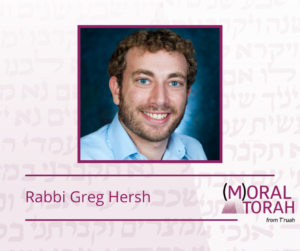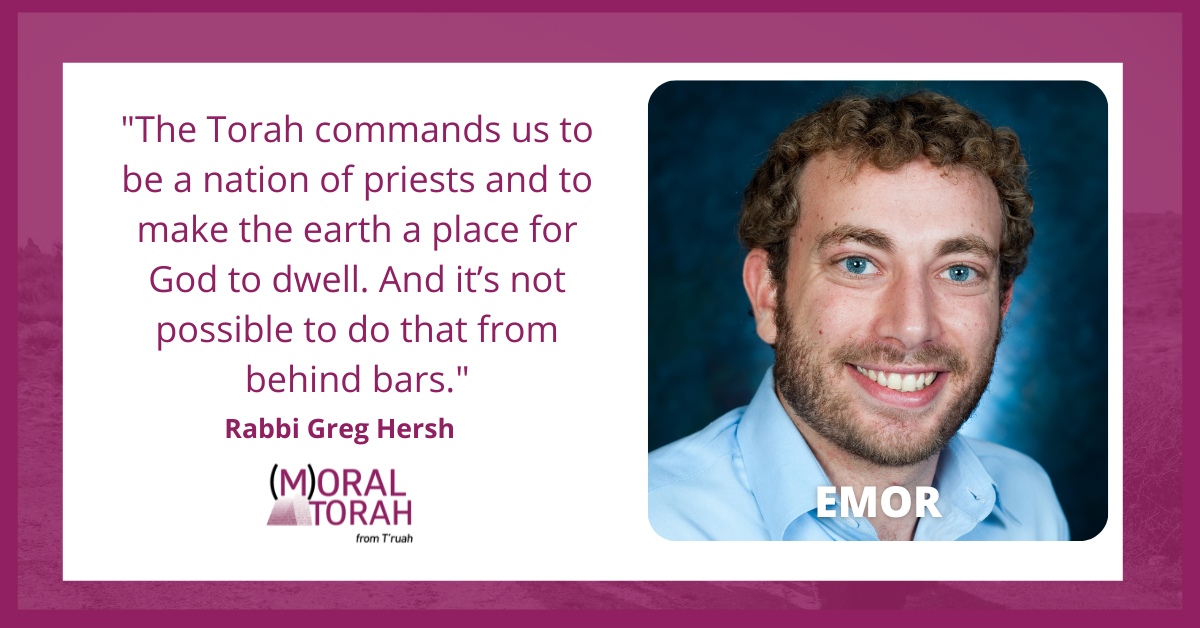A D’var Torah by Rabbi Greg Hersh for Parshat Emor
Near the end of this week’s parshah, Emor, is one of the only narrative portions in Leviticus. It describes a man who “pronounced the [Divine] Name and cursed. So they brought him to Moses… They placed him in the guardhouse (mishmar) [until his sentence would] be specified to them by the word of THE ETERNAL.” (Leviticus 24:11-12) This is one of very few instances in the Tanakh where any kind of prison or incarceration is mentioned.
The Torah itself, surprisingly, has very little to say on the subject of imprisonment. It lays out 613 laws, with corresponding punishments if we fail to observe them. But being imprisoned was not a punishment in itself; rather, it was a mishmar — temporary custody where people waited for Moses to ask God how to handle them. Of all the biblical punishments spelled out in the Torah, from restitution to stoning, prolonged imprisonment doesn’t make the list.
I argue that the reason the Torah is so silent about prisons is because that’s not where God wants us! Instead of promoting incarceration, the Torah acknowledges our human imperfections and offers various paths of teshuvah, where a person can make penance, atonement, rehabilitation, and an ultimate purging so that they can resume life with a clean slate. The Torah commands us to be a nation of priests and to make the earth a place for God to dwell. And it’s not possible to do that from behind bars.
Sign up to receive (M)oral Torah in your inbox each week.
You may be familiar with Psalm 146, which opens, “Halleli nafshi et Hashem” — “My soul praises God.” The Psalmist then lists several good reasons for that appreciation. Verse 7 states how God “performs justice for the oppressed, gives bread to the hungry,” “Hashem matir asurim, God releases the captive.”
That’s the kind of God I want to sing my praises to! The rabbis of the Talmud used some verses from this psalm as they were formulating Birkot Hashachar, the morning blessings. In the Talmud (Brachot 60b), we learn that when you’re first getting up, after you’ve opened your eyes, the next thing you do is to stretch out and sit up. “Upon sitting up straight, one should recite: Baruch matir asurim” — blessed is the One who sets captives free.
For the early rabbinic sages and much of the subsequent rabbinic tradition, matir asurim became divorced from the idea of incarceration. Instead, it refers to the “captivity” we experience during sleep. Our bodies are symbolically imprisoned since we don’t control our movements while we’re sleeping. When we wake up, we’re released from the supposed “shackles” of sleep, and we can move our bodies to see where we are free to move and where there is restriction.
Eventually these blessings became part of the siddur liturgy. The phrase matir asurim also made it into the Amidah, in the Gevurot blessing about God’s power. “Somech noflim v’rofe cholim umatir asurim.” God supports, heals, and liberates. So at least three times a day, Jews have the opportunity to remember and appreciate God as the One who sets captives free, Who releases those who are bound.
Find more commentaries on Emor.
Moving into modernity, in Rav Kook’s commentary on the siddur, Olat Reiyah, he explains the concept of freeing the captive, matir asurim. In his words, “The vital desire of the soul (nefesh) is to be free in her movement, in her physical movement and spiritual movement, with a desire for elevating and renewal.” Rav Kook’s words can be understood in the rabbinic sense, that this has to do with our own body and soul when we wake up. But Kook’s words can also be understood more literally — that inherent to everyone’s soul is a yearning for physical freedom and spiritual elevation.
Generally speaking, it’s the Torah that’s harsh and punitive and the sages who offer a more holistic and justice-oriented approach to society. But for this specific concept of incarceration and matir asurim, I think we should reclaim the biblical meaning of the phrase — that God does not want people to languish in prisons. It’s not about how we wake up in the morning; rather, it’s about how we create a society based on justice and compassion.
 As Americans, we all know of the blight of our prison-industrial complex. Despite claiming to be the land of the free, we incarcerate more people per capita than any other country on earth. As Jews, we are called to pursue justice. When we pray and remind ourselves that God matir asurim, let us think beyond our own bodies. May we turn our prayers into actions, becoming God’s agents on earth as we work to fix our broken carceral system.
As Americans, we all know of the blight of our prison-industrial complex. Despite claiming to be the land of the free, we incarcerate more people per capita than any other country on earth. As Jews, we are called to pursue justice. When we pray and remind ourselves that God matir asurim, let us think beyond our own bodies. May we turn our prayers into actions, becoming God’s agents on earth as we work to fix our broken carceral system.
Rabbi Greg Hersh graduated from George Washington University in 2008 as a double major in Philosophy and Religion, then went on to Reconstructionist Rabbinical College where he received the title of Rabbi in 2016. Rabbi Hersh has served Temple Emmanuel of Wakefield, Massachusetts, since 2016 and has been operating Burning Bush Adventures, providing Jewish wisdom and spirituality in the forests of New England, since 2019.

